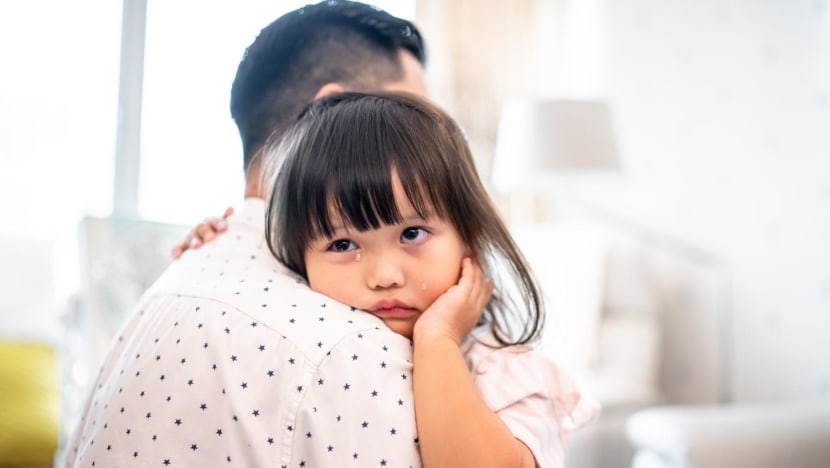Commentary: ‘Mummy is dying because I misbehaved’ – when children’s grief turns to guilt
When children lose parents at a young age, their world changes in ways they do not understand or know how to cope with. Grieving in silence may have consequences in adulthood, says medical social worker Lim Wee Kuan Gracia from HCA Hospice.


This audio is generated by an AI tool.
SINGAPORE: When 46-year-old Susan* was diagnosed with end-stage cancer, her son Adam* believed his misbehaviour had caused her to fall ill. The nine-year-old was stricken with guilt and grief, and entertained distressing thoughts that he would be punished if his mum passed on.
Adam’s father struggled to comfort and reassure his son. Saddled with worries for the family and practical matters, he also did not think Adam would understand what cancer was at his age. Susan also perceived Adam to be coping with the news of her illness and did not require additional emotional support.
This multifaceted dissonance is common in young families facing the difficult reality of illness, death and dying. Childhood grief is devastating, but grieving is often done in silence.
My colleagues in HCA Hospice and I support about 150 children under the age of 18 dealing with loss every year and we see firsthand how the psycho-emotional needs of the children can often be overlooked. Without factual, age-appropriate information, children often fill the void with potentially dangerous misconceptions.
This further creates confusion and distress for children already struggling to comprehend the numerous changes unfolding before them, and can sometimes manifest in the form of regression of behaviour, increased fears, and anxiety and nightmares.
Adverse physical and mental health consequences may be carried into adulthood, if the grief or trauma is not addressed. Various studies have found correlations between childhood bereavement and depression, schizophrenia, substance abuse and suicide attempts in adult life.
UNINTENTIONAL PARENTAL ROADBLOCKS
Parents tend to follow their instinct to protect children from the painful reality of loss. They may avoid bringing children on hospital visits or to funerals and wakes. But even good intentions can sometimes lead to more hurt.
Adam’s father avoided talking about his wife after her death, as he did not want to trigger sad memories for Adam. Such avoidance wrongly signals to the child that it is not alright to talk about the deceased, and negative feelings must be suppressed and avoided.
For the dying parent, it is a race against time. They often feel compelled to do as much as they can for their children, while they are still able to.
For Mdm Junaida*, this translated to increasing expectations towards her seven-year-old daughter to grow up quickly and handle daily activities independently, in her desire to prepare her child for life without her. However, this seemingly authoritarian approach strained their mother-daughter relationship, with her daughter growing more distant from Mdm Junaida.
MANY HELPING HANDS NEEDED TO HELP CHILDREN COPE
A profound emotion like grief permeates every facet of a child’s life. It takes the collaborative effort from the surviving parent, schools and community partners, to help a child navigate the complexities of grief.
The home hospice team could introduce an art therapist to address misconceptions and prepare the children for their parent’s deterioration and death.
A Family Service Centre and the children’s school counsellors could be roped in to support the family with financial matters and counselling.
There is value in a community safety net intricately woven by many helping hands, which offers more opportunities for intervention and referrals. But how can community workers better identify vulnerable children, and know when and how to intervene?
When parents die young, this deviation from the norms of the life cycle can pose a challenge for community support workers when engaging in difficult conversations about childhood grief.
It is perhaps timely for a more structured approach and standardised screening, to be implemented across hospice providers and social service agencies, to identify vulnerable families and children at risk of poor bereavement outcomes.
MAKING ROOM FOR CHILDHOOD GRIEF
In a fast-paced society like Singapore that runs on productivity and efficiency, making room for grief requires deliberate effort.
The weight of childhood grief should not sit on the shoulders of a young child or the surviving parent alone. It needs to be shouldered by those who can guide, support and process their grief with them appropriately.
A dying parent should also know that the act of asking and accepting help is not a sign of weakness. On the contrary, it is an indication of great courage to acknowledge that raising a child in the shadow of impending loss requires a village.
It is a necessary step in supporting not only themselves but also their surviving spouse and young children through the inevitable journey of bereavement.
Teaching children who are struck by this stressful life event to grieve and cope with loss is an investment in the emotional resilience of society at large.
Perhaps then, unlike Adam, young persons will never again bear any misconception, and carry the burden of guilt, that their misbehaviours or actions caused the illness or even death of their beloved parent.
*Pseudonyms were used in this commentary.
Lim Wee Kuan Gracia is Senior Medical Social Worker and Programme Lead, HCA Hospice.


















